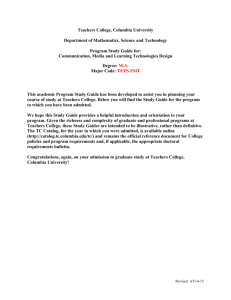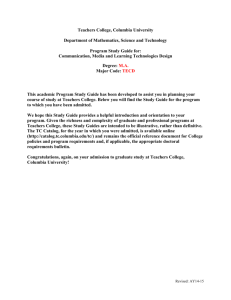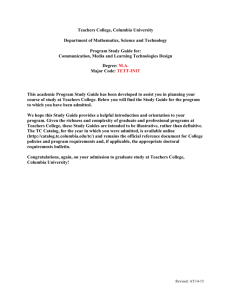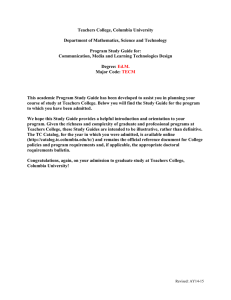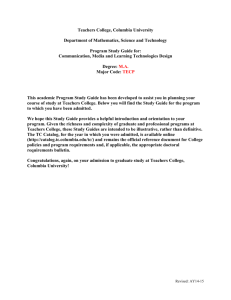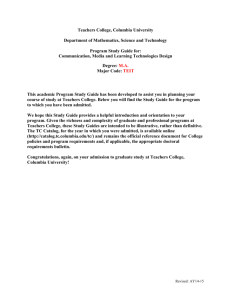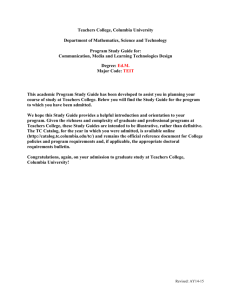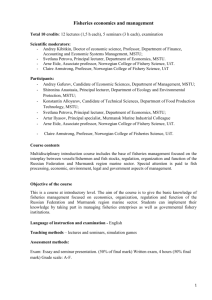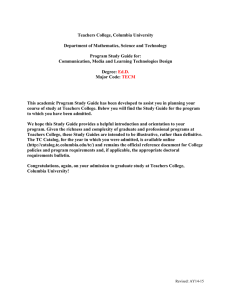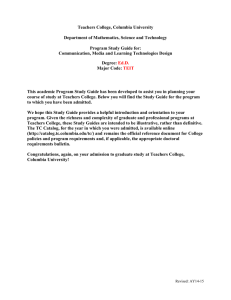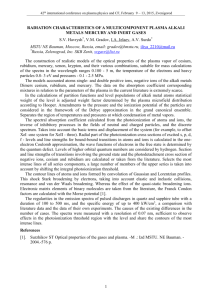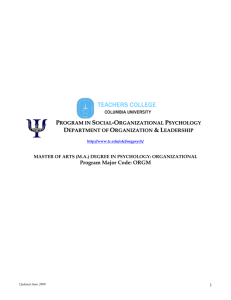Communication and Education - Teachers College Columbia
advertisement
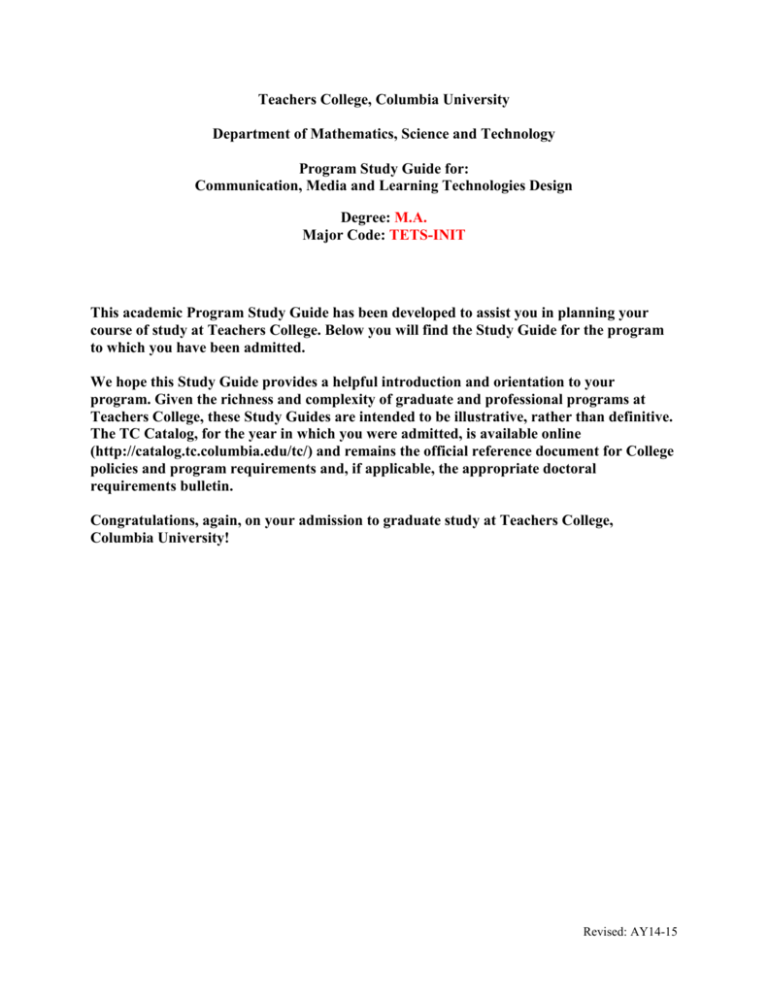
Teachers College, Columbia University Department of Mathematics, Science and Technology Program Study Guide for: Communication, Media and Learning Technologies Design Degree: M.A. Major Code: TETS-INIT This academic Program Study Guide has been developed to assist you in planning your course of study at Teachers College. Below you will find the Study Guide for the program to which you have been admitted. We hope this Study Guide provides a helpful introduction and orientation to your program. Given the richness and complexity of graduate and professional programs at Teachers College, these Study Guides are intended to be illustrative, rather than definitive. The TC Catalog, for the year in which you were admitted, is available online (http://catalog.tc.columbia.edu/tc/) and remains the official reference document for College policies and program requirements and, if applicable, the appropriate doctoral requirements bulletin. Congratulations, again, on your admission to graduate study at Teachers College, Columbia University! Revised: AY14-15 2 TEACHERS COLLEGE COLUMBIA UNIVERSITY Department of Mathematics, Science and Technology COMMUNICATION, MEDIA AND LEARNING TECHNOLOGIES DESIGN PROGRAM Technology Specialist K-12: Initial Teaching Certification Degree: Master of Arts (M.A.) Major Code: TETS-INIT Brief Program Description This is a Master of Arts degree program leading to an initial teaching certificate in New York State. Program goals include preparing individuals to use technology as a set of tools with students, to work effectively with teachers to help them learn to use technology and design, and implement curriculum in which technology is well integrated. Completing the program requires 38 Teachers College points, as well as, 100 hours of fieldwork and 40 days of student teaching. Minimum Point Requirement The program requires 38 points of coursework. Course points from previous, non-Teachers College work cannot be transferred in to count toward the 38 points required for this M.A. degree. Required Courses (19 points) The program has six required core courses in the department for 19 points MSTU 4001: Technology and School Change (3 points) MSTU 4005: Equity, Ethics and Social Issues (3 points) MSTU 4029: Managing Educational Technology Resources (3 points) MSTU 4031: Object-Oriented Theory and Programming I (3 points) and MSTU 4032: Object-Oriented Theory and Programming Lab (1 point) or MSTU 5003: Theory and Programming: Interactive Media I (3 points) MSTU 4133: Cognition and Computers (3 points) MSTU 4052: Computers, Problem Solving, and Cooperative Learning (3 points) In addition, 100 hours of Fieldwork in schools will be assigned, as a part of core courses. A total of 9-10 points chosen from the following or similar courses from outside CMLTD. If these courses are not available, others similar to them can satisfy the requirement. NOTE: Courses from this category can be used to meet the Breadth Requirement (see below). C&T 4052: Designing Curriculum and Instruction HBSE 5910: Problems in Special Education: Policy/Administration And one of the following two: HUDK 4022: Developmental Psychology: Childhood HUDK 4029: Cognition and Learning Revised: AY14-15 3 Required Practica (6 points) MSTU 4700: Student Teaching Practicum in Educational Technology Elementary Student Teaching (one semester) Secondary Student Teaching (one semester) Breadth Requirement (6-9 points) All [M.A., Ed.D., etc.] students must complete a minimum of three courses, each for at least two credits, at Teachers College and outside the Communication, Media and Learning Technologies Design Program (that is, TC courses with a prefix other than MSTU). Elective Courses (3-4 points) Between the Required Courses and the Breadth Requirement Courses (a total of 34-35 points), a total of 3-4 points are left for electives. Skills courses do not meet this requirement. “Skills” courses include (this is a sample list): MSTU 5191: Educational Video Production I MSTU 5199: Database Driven Website Development; Director; 3-D Modeling; Flash Communication Server MSTU 5814: Adobe in Design; Digital video; GIS in Curriculum; Creating Dynamic Websites. Statement about the Required, Integrative Project At the conclusion of the pre-service program, candidates will prepare a final integrative project. The project may vary considerably from candidate to candidate, depending on her or his particular interests. In general, though, all projects will share these characteristics: They will be deeply informed by readings and research done throughout the program. They will be informed by candidates’ reflections on their experiences during the program, and what they have learned about students’ use of and learning with technologies. They will focus on some aspect of planning for the future, and in this way advance the field by contributing candidates’ ideas on how the use of technology in schools may be improved. They will address the problems and issues involved in using technology fairly and equitably to advance the learning of all children. Projects may include the development of websites for particular purposes, such as providing information or staff development with teachers, increasing communication between teachers or between any members of the school community, or documenting learning with technology. Projects may also include the use of other types of media, such as videotapes or audiotapes collected to document or to study students’ use of technologies, or may take the form of traditional papers. All projects will be presented to other students and faculty in the program, and will be evaluated in terms of the four criteria outlined above. (Integrative projects do not receive Revised: AY14-15 4 formal letter grades. “Evaluation” is meant here only in the sense of feedback to the candidate.) Project criteria and expectations will be outlined by students’ Masters Adviser. Student Teaching/fieldwork/practicum/internship requirements and information Fieldwork consists of 100 hours students must spend in schools prior to student teaching. Specific fieldwork assignments are required by some core courses. Fieldwork activities include: observing students at work using technology, working in classes with individual children or groups of students, researching and examining software. Fieldwork is organized and supervised by course instructors, together with the program advisor. Cooperating classroom teachers and technology coordinators invite students to use their classes as field sites and assist students in their work. Some of our courses are offered online. Students are welcome to take a limited number of these; however, any fieldwork associated with them must be done in our partner schools. Student Teaching placements total 40 days in schools: 20 days in an elementary placement, and 20 days in a secondary placement. These placements will, for the most part, occur in local schools that are our program’s partners. It will be possible, in rare cases, to make arrangements with other schools. Student teaching is organized and supervised by the program coordinators, Professor Howard Budin (212-678-3773) and Professor Ellen Meier (212-678-3829). Certification and/or licensure requirements and information checklist ____ Complete the Technology Education Specialist M.A. degree. ____ Pass the NYSTCE Liberal Arts and Science Test (LAST). ____ Pass the NYSTCE Elementary/ Assessment of Teaching Skills-Written: ATS-W (Elementary). ____ Pass the NYSTCE the Content Specialty Test- CST—Technology Education. ____ Complete 2 workshops: child abuse and violence prevention (can be done online at: www.childabuseworkshop.com this website has a link to the violence prevention workshop. ____ Get fingerprint clearance; for information, contact José Osorio in the Office of Teacher Education (411 Zankel Hall; 212-678-3502). ____ When the M.A. degree is awarded; file an Institutional Recommendation Data Form in the Office of Teacher Education (OTE) along with required documents (official bachelors’ transcript, workshops proof). New York has certification reciprocity with over 35 states. For more information on reciprocity or permanent state certification contact José Osorio; OTE; 411 Zankel Hall; 212-678-3502; http://www.tc.columbia.edu/ote/. Revised: AY14-15 5 ____ Create a NYSED-TEACH account and file for the electronic certificate. (NYSEDTEACH website: www.highered.nysed.gov/tcert) The Office of Teacher Education/School-Based Support Services (OTE/SSS ) serves as an ongoing resource to this certification program and provides information, support and resources to faculty and students engaged in the certification process. Special requirements for professional education programs under NCATE review 1. Program entry-level benchmark or licensure test or professional examinations of content knowledge will be measured by the NYSTCE Content Specialty Test for Technology Education. 2. Assessment of content knowledge in the field of Educational Technology Leadership. This is measured through assessment of a curriculum unit designed by the candidate that integrates technology. The unit should be grounded in Wiggins’ and McTighes’ (2005) Understanding by Design (UbD) approach, and focus on how software tools may be used for problem-solving and student collaboration. This work will be completed as part of MSTU 4052: Computers, Problem Solving, and Cooperative Learning. 3. Assessment that demonstrates candidates can collaborate effectively; plan, design, and model effective learning environments; and plan and implement professional experiences required of a technology leader. This is measured through the development of a curriculum unit, cooperatively designed and planned by the candidate and the supervising teacher in Understanding by Design format (Wiggins & McTighe, 2005). A rubric will assess the collaboration and design features. 4. Assessment that demonstrates candidates’ knowledge, skills, and dispositions are applied effectively in practice. Candidates will be observed and assessed by one of the program supervisors using a rubric for teaching practice. 5. Assessment that demonstrates the candidate models, designs, and disseminates methods and strategies in technology that enhance student learning. Candidates will thoroughly document a carefully designed and implemented classroom project. A project rubric assessing implementation methods and strategies is used to capture key elements of the placement project, including, for instance, assessment of student learning. 6. Assessment that demonstrates the candidate understands and can develop programs that address the social, legal and ethical issues related to technology within the district/region/state. Candidates will create a technology plan for a real or fictitious school. If the plan is for an existing school, it should have details that fit the needs of that school. If not for an actual school, the plan should discuss options in appropriate planning areas. A rubric will be used to assess key factors for a technology plan. This work will be completed as part of MSTU 4052, 4005 and 4029. 7. Assessment that addresses how the candidate uses technology to plan and implement effective assessment and evaluation strategies. Candidates will develop a case study of a real or fictitious school that documents steps and strategies for using technology effectively for assessment and evaluation. This work will be completed as part of the course work for MSTU 4001: Technology and School Change. Revised: AY14-15 6 8. Assessment that addresses facilitation of a shared vision for integration of technology and how to foster an environment and culture conducive to the realization of the vision. Please see the description of the integrative project above. Transfer Credit Course points from previous, non-Teachers College work cannot be transferred in to count toward the 38 points required for this M.A. degree. Statement about Satisfactory Progress Students are expected to make satisfactory progress toward the completion of degree requirements. Program faculty will annually review each student’s progress. Where there are concerns about satisfactory progress, students will be informed by the program faculty. If a student is performing below expectations he/she may be required to complete additional course work. The program will provide a plan and timeline for remediation so students know the expectation for them to continue in the program. If satisfactory progress is not maintained a student may be dismissed from the program. Please see the statement on policy of grades at Teachers College. URL: http://catalog.tc.columbia.edu/tc/catalogdetail/policiesproceduresdocuments/grades/ Standard Policies and Procedures Services for Students with Disabilities: The College will make reasonable accommodations for persons with documented disabilities. Students are encouraged to contact the Office of Access and Services for Individuals with Disabilities for information about registration (163 Thorndike Hall; 212-678-3689; TTY: 212-678-3853). Services are available only to students who are registered and submit appropriate documentation. Statement on Academic Conduct: A Teachers College student is expected to refrain from any conduct, including cheating, plagiarizing, or purchasing documents submitted for academic evaluation, that calls into question his/her academic and/or professional probity. Decisions regarding academic evaluation in all aspects of students’ work at the college, including course work, certification examinations, clinical or field experiences, and preparation of dissertations, are within the sole jurisdiction of the faculty concerned, including as appropriate, the department or program staff members. Disciplinary actions (e.g., reprimand, suspension, or dismissal) in cases of academic misconduct can be imposed by the Vice Provost or the Committee on Student Conduct. Resolution of Student Academic Program Concerns: Any student who has a concern regarding an academic matter may seek assistance. The procedure for resolving academic program concerns (see note of grade correction process below) begins with either the faculty member (if the concern is related to a course) or the student’s advisor. If the student is not satisfied with the response or resolution achieved at this first level, or if speaking with the faculty member presents a conflict of interest for the student, the student should proceed to speak with the Program Coordinator in the area in which the academic concern resides. If the student is not satisfied with the response or resolution achieved through the Program Coordinator, the student should proceed to speak with the Chair of the academic department in which the academic concern resides. If the student is still not satisfied with the response Revised: AY14-15 7 or resolution achieved through the Department Chair, or if speaking with the Department Chair presents a conflict of interest for the student, the next step is to contact the Office of the Vice Provost. At any stage of the process, students are welcome to seek the advice and guidance of the Ombudsman, who is charged with attempting to informally resolve student dissatisfaction of an academic nature on a completely confidential basis. Grade Correction Procedure: The instructor for a course has the responsibility for setting the requirements for a course and making an evaluation of students’ work. Once a grade has been given, the instructor is not free to change the grade unless the instructor indicates to the Registrar that an error was made in the original grade transmitted. If a student believes that an error has been made, he/she must take the initiative in bringing about the necessary correction prior to the conclusion of the semester immediately following the semester in which the course was taken. The normal procedure for effecting a correction would be through direct discussion between the student and the instructor. If redress cannot be attained through such discussions, the student may next appeal to the department chairperson of the department offering the course. If resolution cannot be attained through appeal, the student may next appeal to the Dean. In situations where the student feels that such an appeal process might not be in the student’s interest, counsel and assistance can be sought from the Office of the College Ombudsman and the Office of the Vice Provost. (Continued on next page) Revised: AY14-15 8 Technology Specialist K-12: Initial Certification (M.A.; Program Code: TETS-INIT; Minimum Points: 38) The following grid provides a way to conceptualize your progress through the program. Place the semester and year you anticipate enrolling in a course under "Enrollment Date." Place the semester and year in which you completed a course under "Date Completed." Enrollment Date Date Completed Required Courses (19 points) MSTU 4001: Technology and School Change MSTU 4005 Equity, Ethics and Social Issues MSTU 4029: Managing Educational Technology Resources MSTU 4031: Object-Oriented Theory and Programming I or MSTU 5003: Theory and Programming: Interactive Media I MSTU 4133: Cognition and Computers MSTU 4052: Computers, Problem Solving, and Cooperative Learning 9-10 points chosen from the following or similar courses. Courses can count under Breadth Requirement. o C&T 4052: Designing Curriculum and Instruction o HBSE 5910: Problems in Special Education: Policy/Administration (or another policy course) And one of the following two: o HUDK 4022: Developmental Psychology: Childhood o HUDK 4029: Cognition and Learning Required Practica (6 points) MSTU 4700 Student Teaching Practicum Elementary Student Teaching Placement Secondary Student Teaching Placement Breadth Requirement (6-9 points) All [M.A., Ed.D., etc.] students must complete a minimum of three courses, each for at least two credits, at Teachers College and outside the Communication, Media and Learning Technologies Design Program (that is, TC courses with a prefix other than MSTU). List your breadth requirement courses below. Revised: AY14-15 9 Elective Courses (3-4 points) A total of 3-4 points are left for electives to meet the 38 point requirement. Skills courses do not meet this requirement. Integrative Project List completion date: To help your planning, the following grid shows when courses are typically offered. However, while every effort is made to offer courses as shown below, unexpected developments can result in changes. You should check with your advisor and with the current schedule of classes during the registration period to confirm a given course's availability. Please note that the following is a guide only, and not a definitive statement confirming that a class will be offered as shown. Unless otherwise noted, courses are offered f2f.1 Course Number and Name MSTU 4001: Technology and School Change MSTU 4005: Equity, Ethics and Social Issues MSTU 4029: Managing Educational Technology MSTU 4031: Object-Oriented Theory and Programming I or MSTU 5003: Theory and Programming: Interactive Media I MSTU 4052: Computers, Problem Solving and Cooperative Learning MSTU 4133: Cognition and Computers Breadth Courses C&T 4052: Designing Curriculum and Instruction HBSE 5910: Problems in Special Education: Policy/ Administration (or another policy course) And one of the following two: HUDK 4022: Developmental Psychology: Childhood HUDK 4029: Cognition and Learning 1 Fall Semester Yes Yes, online only Yes Yes Spring Semester Yes Yes, online only Yes, online only Yes, f2f and online Yes Yes Yes Yes Yes Yes Face-to-face, in a classroom setting, as opposed to online. Revised: AY14-15
